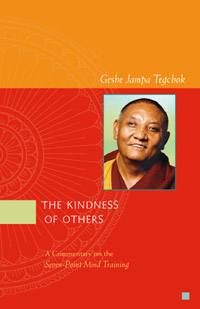| In this book, Khensur Rinpoche Geshe Jampa Tegchok explains how we can train our mind away from self-cherishing, the cause of all suffering, and develop compassion, the cause of everything that is good. He bases his explanation on Kadampa Geshe Chekawa’s classic text, The Seven Point Mind Training, which, amongst other things, teaches us how to transform problems into happiness.
You can read this book here or order a print copy or ebook version of the book from the Lama Yeshe Wisdom Archive. |
The Kindness of Others
The Kindness of Others: Editor's Introduction
Chapter One: Motivation
Chapter Two: The Seven-Point Mind Training
Chapter Three: The First Point - The Preliminaries as a Basis for the Practice, Training in Bodhicitta
Chapter Four: The Second Point - The Actual Practice,Training in Bodhicitta
Chapter Five: The Third Point - Transforming Adverse Circumstances into the Path
Chapter Six: The Fourth Point - The Integrated Practice of a Single Lifetime
Chapter Seven: The Fifth Point - The Measure of Having Trained the Mind
Chapter Eight: The Sixth Point - The Commitments of Mind Training
Chapter Nine: The Seventh Point - The Precepts of Mind Training
Chapter Ten: Conclusion
Appendix: The Seven-Point Mind Training
Bibliography and Recommended Reading
Geshe Jampa Tegchok
"Shantideva pointed out that everything good—every form of happiness, all positive qualities and so forth—comes through the kindness of others. Therefore, the mind devoted to their welfare is like a wish-fulfilling jewel, the source of all happiness and everything good and useful in the world. Just as a farmer who possesses an extremely fertile field, where everything he plants always grows, is very happy to have it and cherishes and takes great care of it, we should feel the same way about other sentient beings—that they are extremely valuable, and cherish and take care of them.
pointed out that everything good—every form of happiness, all positive qualities and so forth—comes through the kindness of others. Therefore, the mind devoted to their welfare is like a wish-fulfilling jewel, the source of all happiness and everything good and useful in the world. Just as a farmer who possesses an extremely fertile field, where everything he plants always grows, is very happy to have it and cherishes and takes great care of it, we should feel the same way about other sentient beings—that they are extremely valuable, and cherish and take care of them.
"It is interesting that, whether we are Buddhist or not, if we think about the great kindness of all beings it will be evident that all our happiness does indeed depend upon them."
In this book, Khensur Rinpoche Geshe Jampa Tegchok explains how we can train our mind away from self-cherishing, the cause of all suffering, and develop compassion, the cause of everything that is good. He bases his explanation on Kadampa Geshe Chekawa’s classic text, The Seven Point Mind Training, which, amongst other things, teaches us how to transform problems into happiness.



